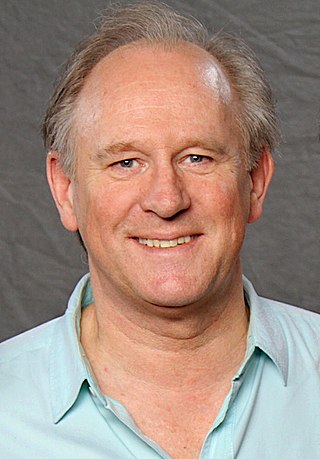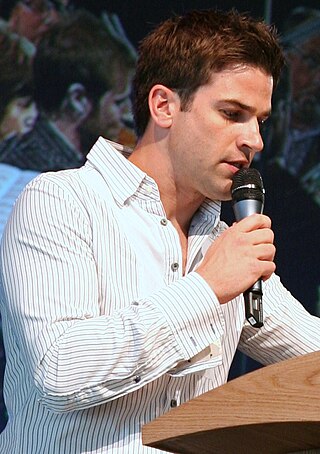Related Research Articles

Peter Malcolm Gordon Moffett, known professionally as Peter Davison, is an English actor. He made his television acting debut in 1975 and became famous in 1978 as Tristan Farnon in the BBC's television adaptation of James Herriot's All Creatures Great and Small stories. He subsequently played the fifth incarnation of the Doctor in Doctor Who from 1981 to 1984.

BBC One is a British free-to-air public broadcast television channel owned and operated by the BBC. It is the corporation's oldest and flagship channel, and is known for broadcasting mainstream programming, which includes BBC News television bulletins, primetime drama and entertainment, and live BBC Sport events.

Gethin Clifford Jones is a Welsh television presenter. He was an active rugby union player while at Manchester Metropolitan University and, after graduation, he began his television career on Welsh language channel S4C as a presenter of children's programmes such as Popty, Mas Draw and the flagship children's entertainment show Uned 5.
This is a list of British television-related events in 1976.
This is a list of British television-related events in 2005.

The Bill is a British police procedural television series, first broadcast on ITV from 16 October 1984 until 31 August 2010. The programme originated from a one-off drama, Woodentop, broadcast on 16 August 1983.
This is a list of British television related events from 1997.
This is a list of British television related events from 1995.
This is a list of British television related events from 1992.
This is a list of British television related events from 1990.
This is a list of British television related events from 1989.
This is a list of British television related events from 1987.
This is a list of British television related events from 1984.
This is a list of British television-related events from 1983.
This is a list of British television related events from 1982.
This is a list of British television related events from 1981.
This is a list of British television related events from 1968.
This is a list of events that took place in 2010 related to British television.
References
- 1 2 3 Rowland, Yvette. "Distant Shores". self. Retrieved 22 October 2009.
- ↑ "Craster – A Visitor's Guide". northumberland-coast.co.uk. Retrieved 23 October 2009.
- ↑ Not to be confused with the real-life Scottish Hildasay.
- ↑ "Prisoner of paradise". 1 August 2005. Retrieved 22 October 2009.[ permanent dead link ]
- ↑ "Ratings – Who's reaping rewards of Freeview sales uplift?". Broadcast Now. broadcastnow.co.uk. 27 January 2005. Retrieved 23 October 2009.
- ↑ Plunkett, John (13 January 2005). "Houswives favourite for C4". The Guardian. Retrieved 23 October 2009.
- ↑ Brook, Stephen (20 January 2005). "BBC1's FA Cup drama brings in over 8m". The Guardian. Retrieved 23 October 2009.
- ↑ Deans, Jason (27 January 2005). "Football gives Sky a second leg up". The Guardian. Retrieved 23 October 2009.
- ↑ Deans, Jason (3 February 2005). "Good night's sleep for BBC1". The Guardian. Retrieved 23 October 2009.
- ↑ Deans, Jason (10 February 2005). "Football bore draw pulls in nearly 8m". The Guardian. Retrieved 23 October 2009.
- ↑ Caleb Ranson (writer); Sue Pritchard (producer); Philip John (director). "(untitled on screen)". Distant Shores. Series 2. Episode 1. 46:30 minutes in.
- ↑ Ford, Coreena (30 August 2009). "Tracy Beaker heads North to film at La Gesse". Sunday Sun. Retrieved 23 October 2009.
- ↑ Methven, Nicola; Polly Hudson (27 April 2007). "Down the Drain". Daily Mirror. Retrieved 23 October 2009.
- ↑ "Australian Hallmark Channel series page" . Retrieved 22 October 2009.[ permanent dead link ]
- ↑ "Distant Shores – The Shore Family Profiles". Australia. Archived from the original on 25 September 2010. Retrieved 22 October 2009.
- ↑ "VisionTV Fall Highlights 2005–2006" . Retrieved 22 October 2009.[ dead link ]
- ↑ "A Shore thing". VisionTV. 1 March 2006. Retrieved 22 October 2009.[ permanent dead link ]
- ↑ "Distant Shores (Series II)". American Public Television. Summer 2006. Retrieved 23 October 2009.
- ↑ Novakovich, Mary (5 January 2005). "Pick of the day". The Guardian. Retrieved 23 October 2009.
- ↑ Smith, Rupert (6 January 2005). "Rearranged marriages". The Guardian. Retrieved 23 October 2009.
- ↑ "Viewing guide". The Times. 5 January 2005. Retrieved 24 October 2009.[ dead link ]
- ↑ Marlow, Wil (3 January 2005). "Doctor on Distant Shores". The Journal. Newcastle upon Tyne. Retrieved 23 October 2009.